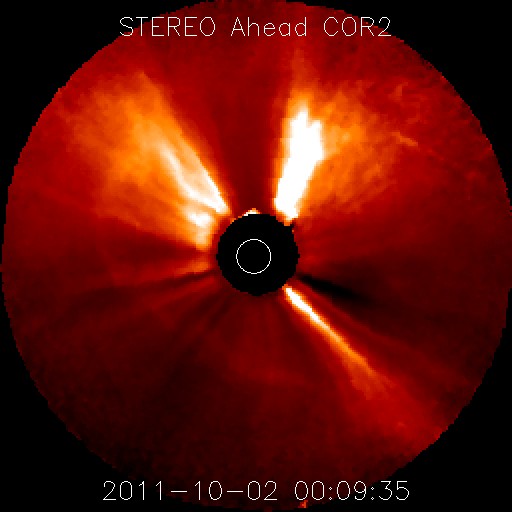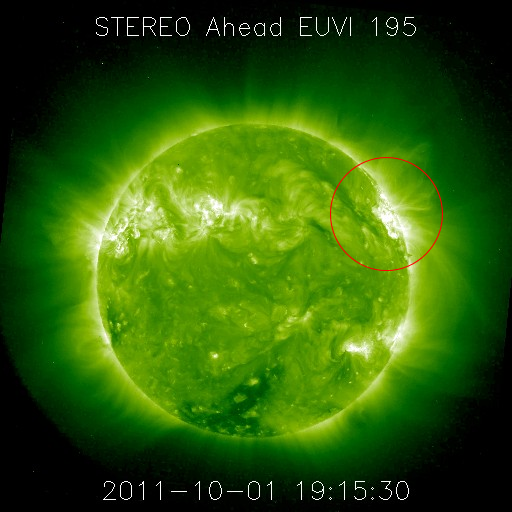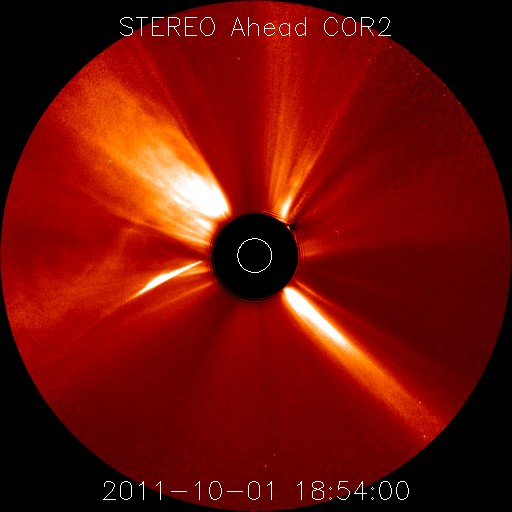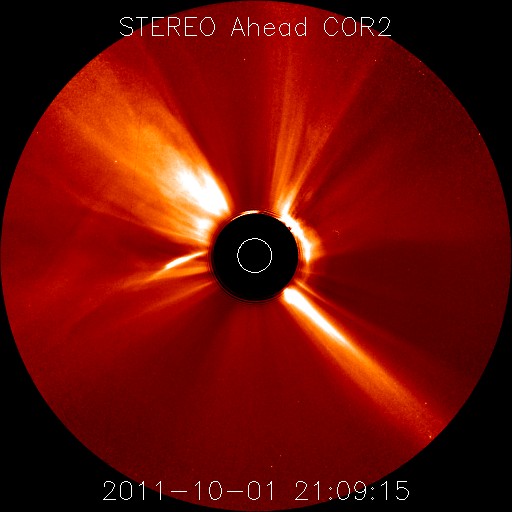It looks like you're using an Ad Blocker.
Please white-list or disable AboveTopSecret.com in your ad-blocking tool.
Thank you.
Some features of ATS will be disabled while you continue to use an ad-blocker.
share:
This video is further confirmation of the EU theory of comets.
Because comets are charged bodies, when they get close to the Sun they will disrupt the electrical stability of the Sun’s double layers causing a coronal mass ejection.
This imagery is highly embarrassing for the standard theorists.
They have no possible explanations for the imagery. They will ignore it and pretend it does not exist. Just like they have for every other video of a comet impacting the Sun and creating a CME. This is at least the third such event that I can recall seeing. There are probably more that we are unaware of because they scrubbed that imagery as well.
Keep in mind the object heading toward the Sun is most likely only a few miles wide, while the explosion that is coming off the Sun is the size of a planet.
I know this video was posted in another thread, but this thread is about the EU theory's explanation behind what we are observing and the standard theories junk response to it.
Here are a few other such events showing what happens when a comet gets too close to the Sun:
And for a complete EU theory explaination for what you are seeing, watch this video @ time 4:25:
If you want to watch the complete video of Thunderbolts of the Gods, click here.
Because comets are charged bodies, when they get close to the Sun they will disrupt the electrical stability of the Sun’s double layers causing a coronal mass ejection.
This imagery is highly embarrassing for the standard theorists.
They have no possible explanations for the imagery. They will ignore it and pretend it does not exist. Just like they have for every other video of a comet impacting the Sun and creating a CME. This is at least the third such event that I can recall seeing. There are probably more that we are unaware of because they scrubbed that imagery as well.
Keep in mind the object heading toward the Sun is most likely only a few miles wide, while the explosion that is coming off the Sun is the size of a planet.
I know this video was posted in another thread, but this thread is about the EU theory's explanation behind what we are observing and the standard theories junk response to it.
Here are a few other such events showing what happens when a comet gets too close to the Sun:
And for a complete EU theory explaination for what you are seeing, watch this video @ time 4:25:
If you want to watch the complete video of Thunderbolts of the Gods, click here.
edit on 4-10-2011 by mnemeth1 because: (no reason given)
Originally posted by mnemeth1
Just like they have for every other video of a comet impacting the Sun
Why tell lies to support your silly theory?
sohowww.nascom.nasa.gov...
The video's you posted even came from NASA....
edit on 4-10-2011 by spoor because: (no reason given)
Thank you for reminding me of something else.
Next April Fools day, lets all treat every video on Youtube as if the information in it was real and genuine honest truth, and not merely the ravings of a demented idiot who doesnt know anything about the topic they're making a video on, or a hoax with easily disproven facts.
It'll be fun.
Next April Fools day, lets all treat every video on Youtube as if the information in it was real and genuine honest truth, and not merely the ravings of a demented idiot who doesnt know anything about the topic they're making a video on, or a hoax with easily disproven facts.
It'll be fun.
Originally posted by spoor
Originally posted by mnemeth1
Just like they have for every other video of a comet impacting the Sun
Why tell lies to support your silly theory?
sohowww.nascom.nasa.gov...
The video's you posted even came from NASA....
edit on 4-10-2011 by spoor because: (no reason given)
My "silly" theory comes from a Nobel prize winning plasma physicist.
And while EU theory can provide an clear explanation for why the Sun undergoes a CME nearly every time a comet gets close to it, the standard theory has absolutely NO explanation at all.
This isn't the first, the second, or even the third time we have witnessed the Sun undergo a CME after a comet got too close to it, this happens over and over and over again. The standard theory of the Sun offers absolutely no explanation for why a tiny piece of "ice and rock" should create a planet sized explosion on the Sun.
edit on 4-10-2011 by mnemeth1 because: (no reason given)
An "electric comet" creates a CME on the opposite side of the sun from which it "impacts"?
From STEREO A, which is looking at the side of the Sun about 90º to the the right of what SOHO sees.
Here the beginning of the CME can be seen at the 1 o'clock position. Note that the white ring is where the surface of the Sun is.
Here the CME is more developed, again, on the opposite side of the Sun from Earth.

Sun diver comets do not survive long when they approach the Sun.
From STEREO A, which is looking at the side of the Sun about 90º to the the right of what SOHO sees.
Here the beginning of the CME can be seen at the 1 o'clock position. Note that the white ring is where the surface of the Sun is.
Here the CME is more developed, again, on the opposite side of the Sun from Earth.

Sun diver comets do not survive long when they approach the Sun.
reply to post by Phage
Learn EU theory before claiming that EU theory does not say the explosion should take place on the opposite side of the Sun.
Nice strawman.
Learn EU theory before claiming that EU theory does not say the explosion should take place on the opposite side of the Sun.
Nice strawman.
There is an interesting youtube video of this event. It has sound from a radar I think.
10/1/11 DOUBLE ERUPTION after COMET AND CME by NASA's Solar Dynamics Observatory
Comet Strike
Edit:
Here is the SOHO Page with the C2 and C3 Movies.
10/1/11 DOUBLE ERUPTION after COMET AND CME by NASA's Solar Dynamics Observatory
Comet Strike
Edit:
Here is the SOHO Page with the C2 and C3 Movies.
edit on 4/10/11 by spirit_horse because: (no reason given)
Originally posted by Chadwickus
What are they hiding again?
Hello Chadwickus my friend
We've probably not had the pleasure of exchanging such pleasantries but Phage is (hopefully ) good friend. And we share the same opinions...I hold you also in high regard. It is my understanding from information outside NASA but reliable that we are very lucky to have a fairly stable solar system. I could be wrong but the Sun and Jupiter are of similar size...our moon has infantessimal deviation year on year...and Sun and moon interact with Earth in stable orbit...They also take impacts from said bodies...So I happen to think we are lucky...Of course every now and again there are going to big larger meteorites and comets impacting the Sun etc but the Sun is so powerful and yes it gets a stomach upset every now and again. Our amateur astronomers should be congratulated and revered for their unstinting and relentless interest...if it wasn't for those people we would not discover the odd rogue that lurks every now and again...However we do not give enough credit to those people nor do we give credit to the stability of our solar system...just my two penneth worth and this is nothing to the Sun...someone just happen to capture a spectacular firework display and it will no more affect us than usual ...we will have no power issues etc...believe me we will all know when something big happens even if we are not told by government...we don't give enough credit to our millions of astronomers....
reply to post by mnemeth1
Strawman. I'm not sure how that qualifies as a strawman argument. But I have one for you. Your claim is a non sequitur argument. You have not shown that the comet "impacted" the Sun. You have not demonstrated causation.
So this was a "special" comet? Different from the ones that do not cause CMEs. Different from the ones where the CME occurs on the same side as the "impact"? This one causes a CME which actually seems to have begun before the "impact". I don't suppose it could not have been coincidence that an active region on the opposite side of the Sun produced a CME rather than one of the active regions on the side which the comet "impacted"?
Far side

Near side
Here's what that area was doing 2 days before the "impact".
Wow. An active region produced a big CME. Who'd a thunk it.
Had to have be the "impact". Couldn't have been an active region doing it's thing.
And what exactly was it that NASA was trying to hide again?
Strawman. I'm not sure how that qualifies as a strawman argument. But I have one for you. Your claim is a non sequitur argument. You have not shown that the comet "impacted" the Sun. You have not demonstrated causation.
So this was a "special" comet? Different from the ones that do not cause CMEs. Different from the ones where the CME occurs on the same side as the "impact"? This one causes a CME which actually seems to have begun before the "impact". I don't suppose it could not have been coincidence that an active region on the opposite side of the Sun produced a CME rather than one of the active regions on the side which the comet "impacted"?
Far side

Near side
Here's what that area was doing 2 days before the "impact".
Wow. An active region produced a big CME. Who'd a thunk it.
Had to have be the "impact". Couldn't have been an active region doing it's thing.
And what exactly was it that NASA was trying to hide again?
edit on 10/4/2011 by Phage because: (no reason given)
The electric universe theory has been debunked and shown to be pseudoscientific nonsense that does not stand up to any kind of rigorous examination by
real scientists. As for comets causing cme, its unlikely, but does merit further investigation after recent observations.
TextSpaceWeather.com reports that before 2011 most solar physicists would have discounted these two events as being related, but earlier this year, the Solar Dynamics Observatory (SDO) watched another sungrazer comet disintegrate in the Sun’s atmosphere, and it appeared to interact with plasma and magnetic fields in its surroundings as it fell apart. Could a puny comet cause a magnetic instability that might propagate and blossom into a impressive CME? Most likely this is just a coincidence, but this is definitely an event in which solar scientists are taking a closer look. The comet, named SOHO-2143, was just discovered on Sept. 30 by an amateur astronomer.
Originally posted by Wide-Eyes
What exactly is EU theory?
Please elaborate.
Gravity is really really hard to explain.
So lets ignore it.
EVERYTHING, even gravity, is actually explained by magnets.
Everything, including the whole universe, is run by magnets, and there is *nothing* that cannot be explained by the Electric Universe theory.
The spiral nature of galaxies? Explained by EU theory.
The expansion of the universe? Explained by EU theory.
Dark matter? Explained by EU theory.
Radioactive decay? Explained by EU theory.
The way alien spacecraft are powered? Explained by EU theory.
Why comets cause CME's on the other side of the sun? Explained by EU theory.
Your girlfriend left you? Explained by EU theory.
Why things get lost in the post? Explained by EU theory.
Toast always lands butter side down? Explained by EU theory.
Its very universal.
reply to post by Atzil321
If you look at the links provided by spaceweather.com you will see that the "interaction" being talked about is the way the Sun affects the trail of material left by the comet as it vaporizes. There is no suggestion that the comet has any affect on the Sun whatsoever.
If you look at the links provided by spaceweather.com you will see that the "interaction" being talked about is the way the Sun affects the trail of material left by the comet as it vaporizes. There is no suggestion that the comet has any affect on the Sun whatsoever.
edit on 10/4/2011 by Phage because: (no reason given)
reply to post by mnemeth1
If you are referring to Dr. Hannes Alfvén,
(Libertarian News, August 30 2011: Plasma Cosmology & Electric Universe Theory)
....then, it's puzzling that you didn't mention him by name...if that is indeed the "plasma physicist" that you cited.
Is it because he died in 1995? And, therefore, is not around to be further questioned, nor to refine his "theories"?
The ubiquitous Wikipedia, first stop on discovery usually...article on Dr. Hannes Alfvén
Let's see....his Nobel Prize in Physics was awarded in 1970, and it was his work on Magnetohydrodynamics that earned him that prize.
Here is the Wiki snippet that is applicable to the Astrophysics side of this field of study:
en.wikipedia.org...
The question, though is....despite the good Doctor's work in initiating this field of physics study (which has many applications beyond Astrophysics, apparently), just how readily accept is that narrow aspect, in the larger Astrophysics scientific community? Seems that if there were any validity to it, then there would be far more attention paid to it.
I find it interesting to note that Dr. Alfvén cultivated the genesis of these theories starting as far back as 1937. There were many, many odd and mutually-conflicting notions in the early twentieth century, in many fields of science. The nature of the scientific method culls those that are, while fascinating ideas, not fully formed, nor experimentally repeatable and demonstrable. Still, there are always those personalities that make their own ideas a "pet project" of sorts, and will reject all evidence that refutes it, striving to "make it fit".
Even Einstein erred famously, with his "Cosmological Constant"...a mathematical invention to "balance" some of the equations he was working on. To "make them fit"....he hypothesized incorrectly, as it turned out.
"Einstein's Blunder"
Of course, to Einstein's credit, he admitted his error.
Referring to the "Libertarian News" article on Dr. Alfvén again. It belies a disturbing mindset, that may account for the ardent clinging to his work, by those with certain political leanings:
Indeed. Falls right into place, to some people's agendas....common theme: A sense of paranoia, and distrust of the "establishment". it seems a bit pernicious.
The claims, as presented in that article at least, sound more like "pseudoscience", professed by people who really don't have the educational degrees to fully understand it --- they just like it because it is "against" what they perceive as "those in control".
A bit of an exaggeration? "Nearly every time" is a bit less than a confirming pattern, as well. In science. And, merely attempting to equate the "nearly every time" CME with a comet's proximity, and claiming "proof" of EU, ignores the many other possibilities. To include the simple interaction of matter (comet) with other matter (Sun stuff).
Finally, there is most certainly a lot we still do not yet know, that's the point of science...discovery. It is a fact that electricity and magnetism are connected in some way, and part of the striving to learn more about it will lead to great discoveries. But, when it comes to the macro scale of space, and cosmology..the suggestion that electrical currents are thrumming throughout space in any significant amounts seems to forget that electricity needs a conductor, in order to flow. There might be localized regions in the Galaxy that are dense enough, not a virtual vacuum (as most of it is), where this could occur. I don't think such environments would be healthy for life as we know it, though. Certainly, such a situation would make our Solar System uninhabitable.
My "silly" theory comes from a Nobel prize winning plasma physicist.
If you are referring to Dr. Hannes Alfvén,
....
who won the Nobel Prize in plasma physics.
(Libertarian News, August 30 2011: Plasma Cosmology & Electric Universe Theory)
....then, it's puzzling that you didn't mention him by name...if that is indeed the "plasma physicist" that you cited.
Is it because he died in 1995? And, therefore, is not around to be further questioned, nor to refine his "theories"?
The ubiquitous Wikipedia, first stop on discovery usually...article on Dr. Hannes Alfvén
Hannes Olof Gösta Alfvén (born 30 May 1908 in Norrköping, Sweden; died 2 April 1995 in Djursholm, Sweden)
Let's see....his Nobel Prize in Physics was awarded in 1970, and it was his work on Magnetohydrodynamics that earned him that prize.
The field of MHD was [color=gold]initiated by Hannes Alfvén, for which he received the Nobel Prize in Physics in 1970.
Here is the Wiki snippet that is applicable to the Astrophysics side of this field of study:
en.wikipedia.org...
The question, though is....despite the good Doctor's work in initiating this field of physics study (which has many applications beyond Astrophysics, apparently), just how readily accept is that narrow aspect, in the larger Astrophysics scientific community? Seems that if there were any validity to it, then there would be far more attention paid to it.
I find it interesting to note that Dr. Alfvén cultivated the genesis of these theories starting as far back as 1937. There were many, many odd and mutually-conflicting notions in the early twentieth century, in many fields of science. The nature of the scientific method culls those that are, while fascinating ideas, not fully formed, nor experimentally repeatable and demonstrable. Still, there are always those personalities that make their own ideas a "pet project" of sorts, and will reject all evidence that refutes it, striving to "make it fit".
Even Einstein erred famously, with his "Cosmological Constant"...a mathematical invention to "balance" some of the equations he was working on. To "make them fit"....he hypothesized incorrectly, as it turned out.
"Einstein's Blunder"
Of course, to Einstein's credit, he admitted his error.
Referring to the "Libertarian News" article on Dr. Alfvén again. It belies a disturbing mindset, that may account for the ardent clinging to his work, by those with certain political leanings:
Libertarians should be particularly keen to take note of this cosmology given the massive waste of tax payer money on experiments that have continually proven to be worthless time and time again. Plasma cosmology also offers alternative explanations for “global warming” based on solar activity.
Indeed. Falls right into place, to some people's agendas....common theme: A sense of paranoia, and distrust of the "establishment". it seems a bit pernicious.
The claims, as presented in that article at least, sound more like "pseudoscience", professed by people who really don't have the educational degrees to fully understand it --- they just like it because it is "against" what they perceive as "those in control".
And while EU theory can provide an clear explanation for why the Sun undergoes a CME nearly every time a comet gets close to it.
A bit of an exaggeration? "Nearly every time" is a bit less than a confirming pattern, as well. In science. And, merely attempting to equate the "nearly every time" CME with a comet's proximity, and claiming "proof" of EU, ignores the many other possibilities. To include the simple interaction of matter (comet) with other matter (Sun stuff).
Finally, there is most certainly a lot we still do not yet know, that's the point of science...discovery. It is a fact that electricity and magnetism are connected in some way, and part of the striving to learn more about it will lead to great discoveries. But, when it comes to the macro scale of space, and cosmology..the suggestion that electrical currents are thrumming throughout space in any significant amounts seems to forget that electricity needs a conductor, in order to flow. There might be localized regions in the Galaxy that are dense enough, not a virtual vacuum (as most of it is), where this could occur. I don't think such environments would be healthy for life as we know it, though. Certainly, such a situation would make our Solar System uninhabitable.
new topics
-
Holy Cow! Erm...Six Legged Turkey!!
World Sports: 1 hours ago -
Ben Habib has Left Reform UK
Regional Politics: 4 hours ago -
Turkey Day Rhyme…
Short Stories: 4 hours ago -
Can someone please translate Biden's speech?
US Political Madness: 5 hours ago -
NIH Chief Confesses COVID Initiatives Were "Completely Made Up " OMG Investigates
Health & Wellness: 6 hours ago -
Awesome Dip Recipe
Food and Cooking: 9 hours ago -
Vladimir Putin's speech at the meeting of the CSTO Collective Security Council
World War Three: 9 hours ago
top topics
-
Happy Thanksgiving to ATS
General Chit Chat: 17 hours ago, 9 flags -
NIH Chief Confesses COVID Initiatives Were "Completely Made Up " OMG Investigates
Health & Wellness: 6 hours ago, 9 flags -
Vladimir Putin's speech at the meeting of the CSTO Collective Security Council
World War Three: 9 hours ago, 7 flags -
Can someone please translate Biden's speech?
US Political Madness: 5 hours ago, 7 flags -
Traveling the world with no passport
Social Issues and Civil Unrest: 14 hours ago, 6 flags -
Awesome Dip Recipe
Food and Cooking: 9 hours ago, 5 flags -
Turkey Day Rhyme…
Short Stories: 4 hours ago, 5 flags -
Ben Habib has Left Reform UK
Regional Politics: 4 hours ago, 4 flags -
Holy Cow! Erm...Six Legged Turkey!!
World Sports: 1 hours ago, 1 flags
active topics
-
Traveling the world with no passport
Social Issues and Civil Unrest • 8 • : annonentity -
Turkey Day Rhyme…
Short Stories • 4 • : JJproductions -
Awesome Dip Recipe
Food and Cooking • 4 • : texas thinker -
Mood Music Part VI
Music • 3721 • : BrucellaOrchitis -
NIH Chief Confesses COVID Initiatives Were "Completely Made Up " OMG Investigates
Health & Wellness • 10 • : ColeYounger2 -
Vladimir Putin's speech at the meeting of the CSTO Collective Security Council
World War Three • 52 • : Dalamax -
Holy Cow! Erm...Six Legged Turkey!!
World Sports • 0 • : Flyingclaydisk -
V.P. Kamala Harris releases a video and nobody understands why
US Political Madness • 80 • : xuenchen -
Interesting Video-UFO?
Aliens and UFOs • 20 • : BrucellaOrchitis -
Happy Thanksgiving to ATS
General Chit Chat • 13 • : gort69







